六年级英语期末复习研讨会发言稿
六年级英语复习教学研讨会发言稿
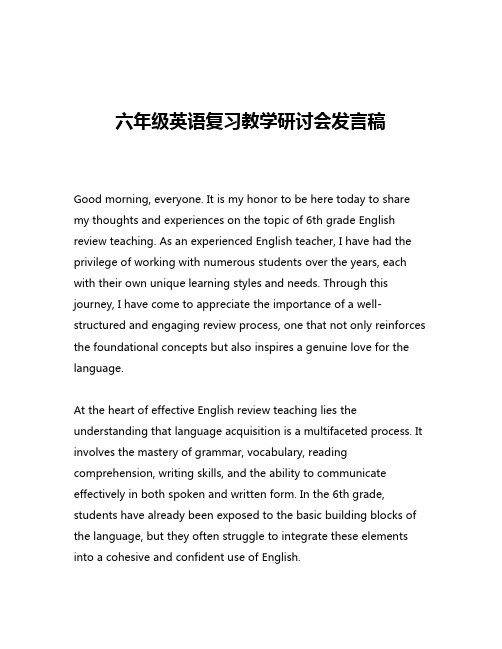
六年级英语复习教学研讨会发言稿Good morning, everyone. It is my honor to be here today to share my thoughts and experiences on the topic of 6th grade English review teaching. As an experienced English teacher, I have had the privilege of working with numerous students over the years, each with their own unique learning styles and needs. Through this journey, I have come to appreciate the importance of a well-structured and engaging review process, one that not only reinforces the foundational concepts but also inspires a genuine love for the language.At the heart of effective English review teaching lies the understanding that language acquisition is a multifaceted process. It involves the mastery of grammar, vocabulary, reading comprehension, writing skills, and the ability to communicate effectively in both spoken and written form. In the 6th grade, students have already been exposed to the basic building blocks of the language, but they often struggle to integrate these elements into a cohesive and confident use of English.One of the key strategies I employ in my review classes is the incorporation of interactive and hands-on activities. Instead of relying solely on traditional lecture-style lessons, I strive to create a dynamic and engaging learning environment that encourages student participation and collaboration. For example, I might organize group discussions where students are tasked with analyzing a short passage, identifying the main ideas, and sharing their interpretations with the class. This not only reinforces their reading comprehension skills but also fosters critical thinking and the ability to articulate their thoughts effectively.Another essential aspect of my review approach is the emphasis on real-world application. Rather than presenting grammar rules or vocabulary in isolation, I make a concerted effort to contextualize these language elements within authentic communication scenarios. This could involve role-playing exercises where students practice conversational exchanges, or writing assignments that challenge them to compose emails, letters, or even short stories using the language skills they have acquired.By connecting the learning material to practical, everyday situations, students are more likely to internalize the concepts and develop a deeper understanding of how English can be used to navigate various social and professional contexts. This, in turn, boosts their confidence and motivation, as they recognize the immediaterelevance and applicability of what they are learning.Another crucial aspect of my review teaching approach is the incorporation of technology-based resources. In today's digital age, students are highly engaged with technology, and leveraging this affinity can be a powerful tool in the language learning process. I often utilize interactive language learning platforms, educational apps, and multimedia resources to supplement my lessons, providing students with opportunities to practice their skills in a dynamic and visually stimulating manner.For instance, I might use online grammar exercises that provide immediate feedback and personalized recommendations, or interactive vocabulary games that make learning new words fun and engaging. By seamlessly integrating technology into the review process, I am able to cater to the diverse learning preferences of my students, catering to visual, auditory, and kinesthetic learners alike.Furthermore, I believe that the review process should not be limited to the classroom setting. To reinforce the learning and encourage continued language development, I often assign homework and project-based activities that encourage students to apply their skills outside of the school environment. This could involve tasks such as conducting interviews with native English speakers, keeping a personal journal in English, or creating multimedia presentations thatshowcase their language proficiency.By extending the learning beyond the classroom, students are able to develop a stronger sense of ownership over their language journey, fostering a lifelong passion for English and a deeper understanding of its importance in our increasingly globalized world.Of course, no review process is complete without a robust assessment strategy. I firmly believe in the importance of both formative and summative evaluations, as they not only allow me to gauge the progress of my students but also provide valuable feedback to guide my instructional approach.In addition to traditional tests and quizzes, I incorporate a variety of alternative assessment methods, such as oral presentations, writing portfolios, and project-based evaluations. This multifaceted approach enables me to capture a more comprehensive understanding of each student's strengths, weaknesses, and areas for improvement, allowing me to tailor my instruction accordingly.Moreover, I firmly believe in the power of collaboration and professional development. As an educator, I am constantly seeking opportunities to engage with my peers, share best practices, and learn from the experiences of others. I actively participate in teacher workshops, attend conferences, and engage in online communitiesof practice, all with the goal of continuously improving my teaching skills and staying abreast of the latest trends and innovations in language education.By fostering a culture of collaboration and continuous learning, I am able to bring fresh perspectives and innovative strategies to my review classes, ensuring that my students receive the highest quality of instruction and support.In conclusion, the effective review of 6th grade English is a multifaceted and dynamic process that requires a comprehensive approach. By incorporating interactive activities, real-world application, technology-based resources, extended learning opportunities, and robust assessment strategies, I am able to create a learning environment that not only reinforces the foundational concepts but also inspires a genuine love for the English language.As we move forward, it is my hope that we, as educators, continue to explore new and innovative ways to engage our students, foster their language development, and prepare them for the challenges and opportunities that lie ahead. Thank you for your time and attention, and I look forward to our continued dialogue and collaboration in the pursuit of excellence in English education.。
小学英语毕业班复习研讨会发言稿
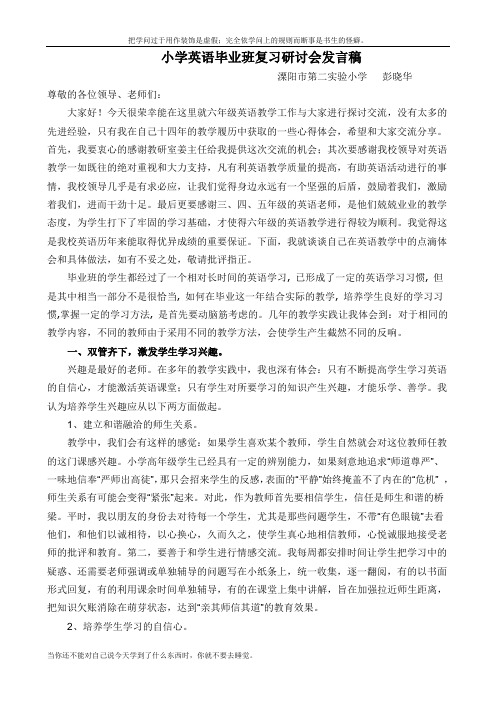
小学英语毕业班复习研讨会发言稿溧阳市第二实验小学彭晓华尊敬的各位领导、老师们:大家好!今天很荣幸能在这里就六年级英语教学工作与大家进行探讨交流,没有太多的先进经验,只有我在自己十四年的教学履历中获取的一些心得体会,希望和大家交流分享。
首先,我要衷心的感谢教研室姜主任给我提供这次交流的机会;其次要感谢我校领导对英语教学一如既往的绝对重视和大力支持,凡有利英语教学质量的提高,有助英语活动进行的事情,我校领导几乎是有求必应,让我们觉得身边永远有一个坚强的后盾,鼓励着我们,激励着我们,进而干劲十足。
最后更要感谢三、四、五年级的英语老师,是他们兢兢业业的教学态度,为学生打下了牢固的学习基础,才使得六年级的英语教学进行得较为顺利。
我觉得这是我校英语历年来能取得优异成绩的重要保证。
下面,我就谈谈自己在英语教学中的点滴体会和具体做法,如有不妥之处,敬请批评指正。
毕业班的学生都经过了一个相对长时间的英语学习, 已形成了一定的英语学习习惯, 但是其中相当一部分不是很恰当, 如何在毕业这一年结合实际的教学, 培养学生良好的学习习惯,掌握一定的学习方法, 是首先要动脑筋考虑的。
几年的教学实践让我体会到:对于相同的教学内容,不同的教师由于采用不同的教学方法,会使学生产生截然不同的反响。
一、双管齐下,激发学生学习兴趣。
兴趣是最好的老师。
在多年的教学实践中,我也深有体会:只有不断提高学生学习英语的自信心,才能激活英语课堂;只有学生对所要学习的知识产生兴趣,才能乐学、善学。
我认为培养学生兴趣应从以下两方面做起。
1、建立和谐融洽的师生关系。
教学中,我们会有这样的感觉:如果学生喜欢某个教师,学生自然就会对这位教师任教的这门课感兴趣。
小学高年级学生已经具有一定的辨别能力,如果刻意地追求“师道尊严”、一味地信奉“严师出高徒”,那只会招来学生的反感,表面的“平静”始终掩盖不了内在的“危机” ,师生关系有可能会变得“紧张”起来。
对此,作为教师首先要相信学生,信任是师生和谐的桥梁。
六年级英语经验交流发言稿与六年级迎接期末考试演讲稿精选汇编

六年级英语经验交流发言稿1、精心备课,提高课堂教学效率。
平时的教学活动中,在郝主任的带领下,我和屈老师、张老师共同研究教材,研究课标,精心备课。
备教材方面,每个单元的学习之前,我先把整单元的内容做一个整体的认知和概括,教材中的let’slearn、let’stalk、Read联系的非常紧密,只有理清它们的内部联系形成知识系统才能在授课中使学生整体认知,使学生新旧知识相结合,产生迁移,提高学生兴趣。
备学生方面,通过学情分析预测学生在学习中各个目标过程的达成情况,然后有针对性的进行教学设计。
2、努力搞好课堂教学,使学生掌握良好的学习方法。
课堂上通过采用各种措施、批评手段促进各个层次学生的提高。
比如教单词时用猜猜游戏、大小声游戏、教句子时用传话筒游戏等都可以调动学生的积极性,同时可以创设一定的情景,使学生在特定的情景中学习,可以加深学生对所学知识的理解和运用。
3、课后辅导及作业力求质量,在作业方面,除了让学生抄写单词,结对记忆单词,还要放在一定的语境中去记单词。
为了提高学生的作业质量我采取作业积分制,每天统计各班作业优秀本数及出错本数,然后责任到人进行整改,优秀的学生可根据规则免作业,极大地提高了学生的积极性。
4、巩固优生,转化后进生,对于优秀的学生,要通过训练巩固他们的学习成果,而后进生的转化,才是提高学生总体成绩的关键,爱心是转化后进生的好方法,对他们多一些赞美,让他们充满自信,体会到成功的快乐,孩子的心灵是敏感的,只有走进他们的心灵,许多问题就会迎刃而解。
第1 页共1 页二、持之以恒,培养学生良好的英语学习习惯1、培养学生认真书写的习惯。
在书写方面,我从小处着眼,不放过纠正每一个学生不良学习习惯的细节和机会,从每一次作业、每一次小测验抓起,使学生认识到书写的重要性。
2、培养学生良好的朗读、背诵英语的习惯。
“书读百遍,其义自见”不仅适用于语文教学,英语教学也不例外。
只有反复朗读,多多背诵,才能积累大量的语言信息,丰富学生的英语词汇量,在阅读、写作时有话可说。
小学英语毕业班复习研讨会教师交流发言稿材料
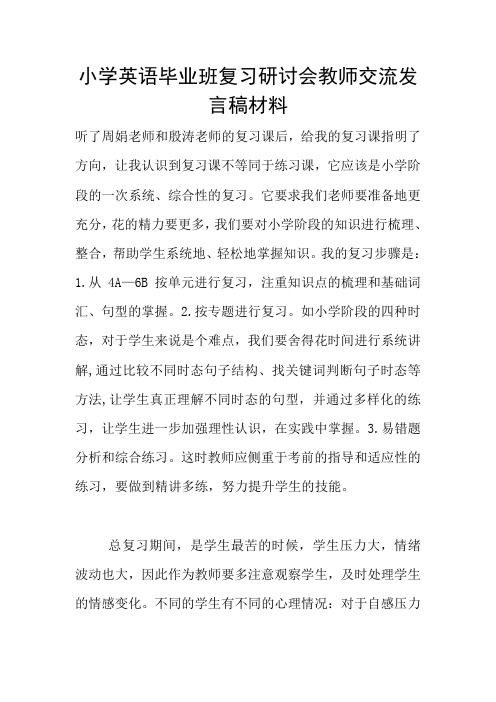
小学英语毕业班复习研讨会教师交流发言稿材料听了周娟老师和殷涛老师的复习课后,给我的复习课指明了方向,让我认识到复习课不等同于练习课,它应该是小学阶段的一次系统、综合性的复习。
它要求我们老师要准备地更充分,花的精力要更多,我们要对小学阶段的知识进行梳理、整合,帮助学生系统地、轻松地掌握知识。
我的复习步骤是:1.从4A—6B按单元进行复习,注重知识点的梳理和基础词汇、句型的掌握。
2.按专题进行复习。
如小学阶段的四种时态,对于学生来说是个难点,我们要舍得花时间进行系统讲解,通过比较不同时态句子结构、找关键词判断句子时态等方法,让学生真正理解不同时态的句型,并通过多样化的练习,让学生进一步加强理性认识,在实践中掌握。
3.易错题分析和综合练习。
这时教师应侧重于考前的指导和适应性的练习,要做到精讲多练,努力提升学生的技能。
总复习期间,是学生最苦的时候,学生压力大,情绪波动也大,因此作为教师要多注意观察学生,及时处理学生的情感变化。
不同的学生有不同的心理情况:对于自感压力太大的同学要耐心地疏导,从思想上为他“减负”,使其能在平静宽松的氛围中进行有序的复习,较好地完成学习任务;对于没有任何心理压力,还没进入复习状态的同学要给予一定的压力,使其在压力之下也能较好地投入到紧张的复习中来;而对于学习困难且心理焦虑烦躁的同学更要给予特别的关爱,一方面要想方设法抽时间为其开小灶,一方面还要不断地鼓励赏识他们,同时要给他们适当地减压,使他们也能保持较好的情绪投入到紧张的复习中,并能尽最大努力取得最好效果。
总之,我们就是要在复习的过程中引导学生自己灵活的运用所学的知识,在运用原有知识的过程中掌握技巧,真正把知识内化成自己的能力,以达到复习的理想效果。
教师们的交流诚恳真切,其实最想听到的就是你们在教学中的烦恼、困惑、真心话、心里话,这样也提供我正确思考、好好思考的思路和源泉,以便更好地为你们服务;当然你们在教学实践中取得成功、得意之时也别忘了到这儿来我们一起分享,也帮助我积累教研工作的经验,以便我更有效地进行教学的指导。
小学六年级英语质量研讨会发言稿三篇精选(最新)
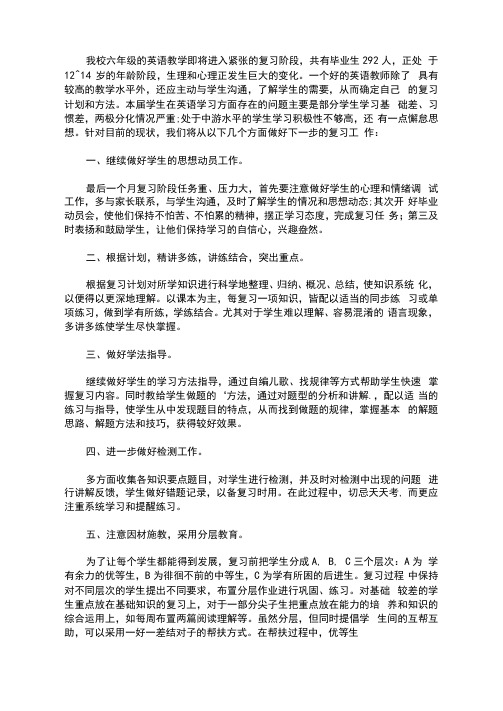
我校六年级的英语教学即将进入紧张的复习阶段,共有毕业生292人,正处于12^14岁的年龄阶段,生理和心理正发生巨大的变化。
一个好的英语教师除了具有较高的教学水平外,还应主动与学生沟通,了解学生的需要,从而确定自己的复习计划和方法。
本届学生在英语学习方面存在的问题主要是部分学生学习基础差、习惯差,两极分化情况严重;处于中游水平的学生学习积极性不够高,还有一点懈怠思想。
针对目前的现状,我们将从以下几个方面做好下一步的复习工作:一、继续做好学生的思想动员工作。
最后一个月复习阶段任务重、压力大,首先要注意做好学生的心理和情绪调试工作,多与家长联系,与学生沟通,及时了解学生的情况和思想动态;其次开好毕业动员会,使他们保持不怕苦、不怕累的精神,摆正学习态度,完成复习任务;第三及时表扬和鼓励学生,让他们保持学习的自信心,兴趣盎然。
二、根据计划,精讲多练,讲练结合,突出重点。
根据复习计划对所学知识进行科学地整理、归纳、概况、总结,使知识系统化,以便得以更深地理解。
以课本为主,每复习一项知识,皆配以适当的同步练习或单项练习,做到学有所练,学练结合。
尤其对于学生难以理解、容易混淆的语言现象,多讲多练使学生尽快掌握。
三、做好学法指导。
继续做好学生的学习方法指导,通过自编儿歌、找规律等方式帮助学生快速掌握复习内容。
同时教给学生做题的‘方法,通过对题型的分析和讲解.,配以适当的练习与指导,使学生从中发现题目的特点,从而找到做题的规律,掌握基本的解题思路、解题方法和技巧,获得较好效果。
四、进一步做好检测工作。
多方面收集各知识要点题目,对学生进行检测,并及时对检测中出现的问题进行讲解反馈,学生做好错题记录,以备复习时用。
在此过程中,切忌天天考, 而更应注重系统学习和提醒练习。
五、注意因材施教,采用分层教育。
为了让每个学生都能得到发展,复习前把学生分成A, B, C三个层次:A为学有余力的优等生,B为徘徊不前的中等生,C为学有所困的后进生。
六年级英语毕复习研讨讲座发言稿
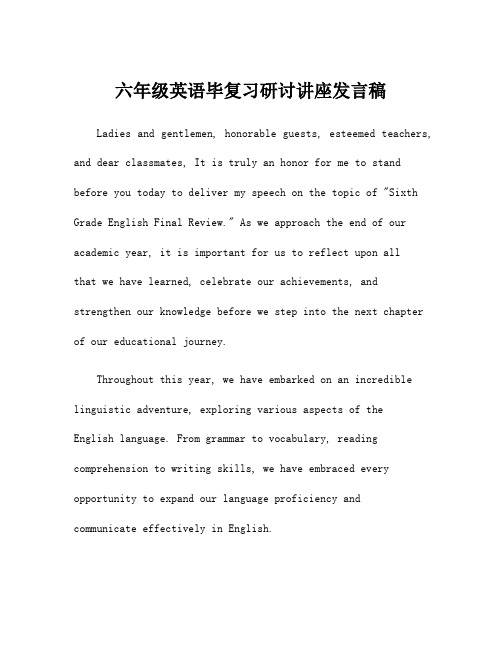
六年级英语毕复习研讨讲座发言稿Ladies and gentlemen, honorable guests, esteemed teachers, and dear classmates, It is truly an honor for me to stand before you today to deliver my speech on the topic of "Sixth Grade English Final Review." As we approach the end of our academic year, it is important for us to reflect upon allthat we have learned, celebrate our achievements, and strengthen our knowledge before we step into the next chapter of our educational journey.Throughout this year, we have embarked on an incredible linguistic adventure, exploring various aspects of theEnglish language. From grammar to vocabulary, reading comprehension to writing skills, we have embraced every opportunity to expand our language proficiency and communicate effectively in English.Firstly, let's focus on grammar, a fundamental aspect of language learning. We have covered a range of grammar rules and structures, enabling us to construct accurate and grammatically correct sentences. Through the study of verb tenses, we can now express actions in the past, present, and future with confidence. Additionally, by mastering the usage of prepositions, pronouns, and conjunctions, we have enhanced our ability to connect ideas and convey our thoughts clearly.Another crucial aspect of language acquisition is vocabulary. Throughout the year, we have diligently expanded our word bank, allowing us to express ourselves moreprecisely and vividly. We have learned new words through various means, including reading books, watching movies, and participating in vocabulary building activities in the classroom. Building a strong vocabulary is essential for both written and oral communication, and it will undoubtedly continue to serve us well in our future studies and beyond.Reading comprehension has been an integral part of our English curriculum. By exploring a diverse range of texts, we have sharpened our reading skills, developed our understanding of different literary genres, and learned to analyze and interpret texts effectively. We have learned to identify main ideas, locate supporting details, and make inferences based on the information provided. These skills are invaluable not only in English but across all subjects and throughout our lives.Writing skills have also been a significant focus this year. We have honed our ability to write coherent paragraphs, essays, and stories, paying attention to structure, organization, and clarity. From crafting persuasive arguments to letting our imaginations soar through creative writing, we have acquired the tools necessary to convey our ideas effectively in written form. Writing is a powerful means of self-expression, and the skills we have developed will continue to serve us well in our personal and academic lives.As we conclude our final review, it is important to reflect on our achievements and acknowledge the progress we have made. Each one of us has grown immensely over the past year, not only in our command of the English language but also in our overall confidence and ability to express ourselves in English. It is crucial that we continue to practice and immerse ourselves in English, even during the holidays, as this will solidify our knowledge and ensure further growth in the coming years.In closing, I would like to extend my heartfelt appreciation to our teachers for their guidance, patience, and dedication throughout this transformative year. Their passion for teaching and their unwavering support have been the driving forces behind our success. I would also like to congratulate my fellow classmates on their hard work and achievements. May we continue to strive for excellence, embrace the joy of learning, and pursue our dreams with unwavering determination.Thank you, and best wishes to all for a bright and successful future!。
小学六年级英语质量研讨会发言稿(最新)
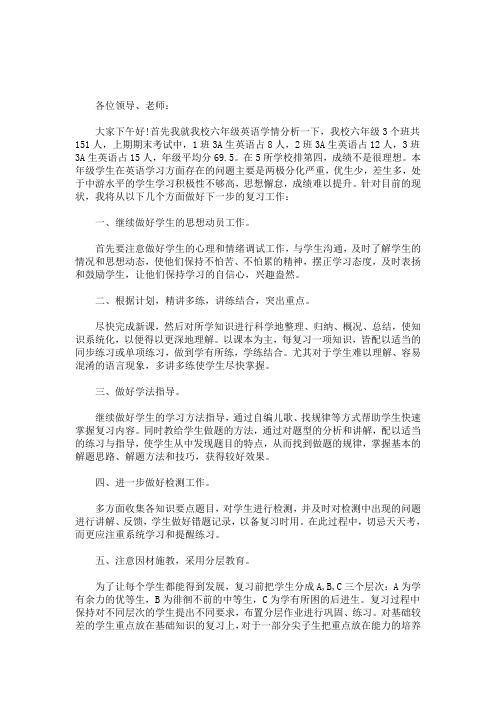
各位领导、老师:大家下午好!首先我就我校六年级英语学情分析一下,我校六年级3个班共151人,上期期末考试中,1班3A生英语占8人,2班3A生英语占12人,3班3A生英语占15人,年级平均分69.5。
在5所学校排第四,成绩不是很理想。
本年级学生在英语学习方面存在的问题主要是两极分化严重,优生少,差生多,处于中游水平的学生学习积极性不够高,思想懈怠,成绩难以提升。
针对目前的现状,我将从以下几个方面做好下一步的复习工作:一、继续做好学生的思想动员工作。
首先要注意做好学生的心理和情绪调试工作,与学生沟通,及时了解学生的情况和思想动态,使他们保持不怕苦、不怕累的精神,摆正学习态度,及时表扬和鼓励学生,让他们保持学习的自信心,兴趣盎然。
二、根据计划,精讲多练,讲练结合,突出重点。
尽快完成新课,然后对所学知识进行科学地整理、归纳、概况、总结,使知识系统化,以便得以更深地理解。
以课本为主,每复习一项知识,皆配以适当的同步练习或单项练习,做到学有所练,学练结合。
尤其对于学生难以理解、容易混淆的语言现象,多讲多练使学生尽快掌握。
三、做好学法指导。
继续做好学生的学习方法指导,通过自编儿歌、找规律等方式帮助学生快速掌握复习内容。
同时教给学生做题的方法,通过对题型的分析和讲解,配以适当的练习与指导,使学生从中发现题目的特点,从而找到做题的规律,掌握基本的解题思路、解题方法和技巧,获得较好效果。
四、进一步做好检测工作。
多方面收集各知识要点题目,对学生进行检测,并及时对检测中出现的问题进行讲解、反馈,学生做好错题记录,以备复习时用。
在此过程中,切忌天天考,而更应注重系统学习和提醒练习。
五、注意因材施教,采用分层教育。
为了让每个学生都能得到发展,复习前把学生分成A,B,C三个层次:A为学有余力的优等生,B为徘徊不前的中等生,C为学有所困的后进生。
复习过程中保持对不同层次的学生提出不同要求,布置分层作业进行巩固、练习。
对基础较差的学生重点放在基础知识的复习上,对于一部分尖子生把重点放在能力的培养和知识的综合运用上,如每周布置两篇阅读理解等。
小学六年级英语复习研讨会发言材料

①学习和掌握教材中用粗写体书写的单词和常用短语。
②特别是要求学生重点识记和灵活运用那些常用的简单的符合拼读规则的单音节的单词。
③对于那些多音节的不符合规则的长单词只要求认读,不要求识记。
4、语法:
①名词单复数形式及基本用法。
②了解1——100以内的数词的写法和简单用法,知道1——20以内的数字的用法。
(一)检测的范围:
今年小学英语毕业检测的范围是:湘少版三年级起点的现行教材,三年级---六年级的全部教学内容。
(二)试卷结构:
检测试卷的内容分听力和笔试两部分。满分为100分。其中听力部分占30%,笔试部分占70%。易、中、难的比例为6:3:1。测试时间为60分钟。
(三)检测的内容:本次检测的内容主要是要考查学生的基础知识和基本技能两个方面的内容,以下就这两个方面作简要说明。
4、听音判断正误。
5、听问句选答语。
6、听短文或对话,选择正确选项完成句子。(短文或对话一般来自教科书)。
(如果可能让我出题,我可能选择1、2、5、6四种题型,分值为6、10、10、4)
二、读写部分。主要题型有:
1、在四线格内用手写体形式填写相邻的大写和小写字母,或者写五个单词,或者一个句子,10分。
③能写出简单的问候语。
④能根据要求为图片、实物等写出简短的标题或描述。
⑤能就简单的问句写出简单的答语。
(四)、检测的题型:针对上面内容,题型多种多样,但近年来我市采取的主要题型有下面这一到的字母或数字。
2、听音,选择与所听内容相符的图片。
3、听音标序号。
2010年小学英语毕业检测总复习指导意见
溆浦县教研室 郑红莲
近几年我县小学毕业生从三年级开始全面开设了英语课,为了全面检查我县实施国家课程改革以来所取得的阶段性成果,经我县教育局领导研究决定,在近几年的小学毕业检测中加试英语科目,并将成绩记入毕业检测的总成绩。为了搞好今年我县小学英语毕业检测工作,今天趁研讨会的机会对“检测范围”、 “试卷结构”、“检测的内容”、 “检测题型” 和“复习建议”五个方面提出个人参考意见,并对每个方面作简单的说明。希望老师们坚持“以标为纲,以书为本”的原则,认真搞好复习工作。
小学六年级英语期末座谈会发言稿
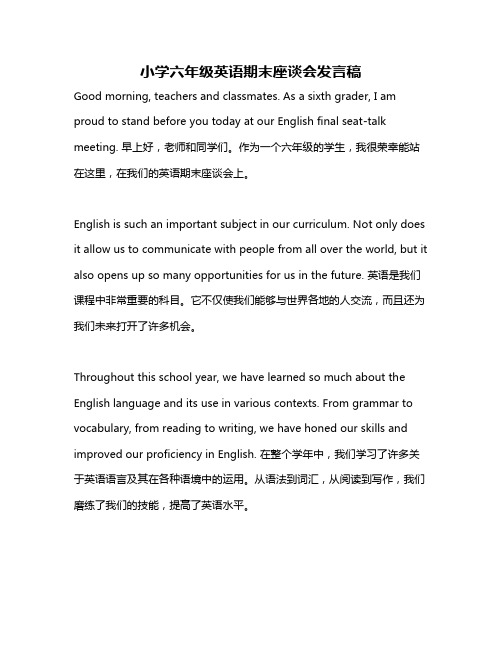
小学六年级英语期末座谈会发言稿Good morning, teachers and classmates. As a sixth grader, I am proud to stand before you today at our English final seat-talk meeting. 早上好,老师和同学们。
作为一个六年级的学生,我很荣幸能站在这里,在我们的英语期末座谈会上。
English is such an important subject in our curriculum. Not only does it allow us to communicate with people from all over the world, but it also opens up so many opportunities for us in the future. 英语是我们课程中非常重要的科目。
它不仅使我们能够与世界各地的人交流,而且还为我们未来打开了许多机会。
Throughout this school year, we have learned so much about the English language and its use in various contexts. From grammar to vocabulary, from reading to writing, we have honed our skills and improved our proficiency in English. 在整个学年中,我们学习了许多关于英语语言及其在各种语境中的运用。
从语法到词汇,从阅读到写作,我们磨练了我们的技能,提高了英语水平。
One of the highlights of this year for me personally was when we had the opportunity to do a group presentation in English. It not only helped us practice our speaking skills but also taught us how to work together as a team. 对我个人来说,这学年的一个亮点是,当我们有机会用英语进行小组报告。
小学六年级英语复习研讨会发言材料

复习的程序
• 小学英语毕业班英语学习的教学计划制定是整个 英语教学过程的指挥棒。好的教学计划的制订能 很好地帮助教师和学生明确学习方向,同时也便 于教师在有限的时间内更好地调控毕业班教学的 整体开展。我们一般分为四个阶段: • 第一阶段:问题征集,制定复习计划; 第二阶段:整理资料,收集信息,召开会议; 第三阶段:教师总结归纳,分类细化; 第四阶段:巩固复习,夯实基础。 其中,第三阶段和第四阶段是非常重要的。
语法教学
在复习书本内容时,解决语法知识点以及时态问题
•名词复数 •形容词比较级 •现在进行时(动词-ing ) •一般现在时(动词单三)
•一般过去时(动词过去式)
•一般将来时
♪其他语法知识(介词,冠词,代词等),老师可以进 行专项练习,亦可让学生自己去发掘
写作教学
• 教师在进行写作教学时,可以尽可能地提供或是 选择多元的写作训练方式,如: • A、关键词式:给出一组词语或是短语,根据词 语或短语写短文。 • B、问题式:给出一系列问题,一一回答,形成 短文。 • C、主题式:结合教学内容,针对某一主题,写 短文。 • D、图片式:给出一张内容丰富的图片,看图写 作。 • E、仿写式:仿照已知文章,结合实际或是提供 的信息,形成短文。
以按单元知识点进行,可以按词汇、句型、篇章
知识点的方式进行,也可专门针对听力、阅读等 能力进行复习。基础知ห้องสมุดไป่ตู้巩固、专项练习和综合
练习相结合进行。
问题征集表中的复习教学困惑:
• 复习的范围和重点,复习的主要方式,复习的程序 • 六年级教材复习进度该如何安排?何时结束课程?什 么时候进行考试? • 话题作文怎么处理? • 音标的教学是否进行? • 如何培养学生的学习兴趣? • 如何解决学生的两级分化现象。
六年级下册英语复习研讨会校长发言稿

六年级下册英语复习研讨会校长发言稿全文共3篇示例,供读者参考篇1Good morning, teachers and students.I am very pleased to see all of you here today for our Grade 6 Lower English Review Seminar. As we all know, this is a crucial time for our students as they prepare for their upcoming final exams. I believe that by coming together today, we can share our insights and strategies to help our students succeed.First and foremost, I would like to commend all the teachers for their hard work and dedication in preparing our students for this important exam. Your commitment to excellence is truly inspiring, and I have no doubt that our students are in good hands.I would like to emphasize the importance of effective communication between teachers, students, and parents during this time. It is essential that students understand what is expected of them and have the support they need to succeed. I encourage teachers to be open and accessible to students andparents, and to provide clear guidance on how to prepare for the exams.Furthermore, I urge all teachers to utilize a variety of teaching methods and resources to engage students and cater to different learning styles. We must ensure that our students are fully prepared for the exam and have the necessary skills and knowledge to excel.In addition, I would like to remind everyone that success is not just about academic achievements. It is also about character development and holistic growth. Let us continue to inspire our students to be curious, creative, and resilient individuals who can face any challenge with confidence.Lastly, I would like to express my gratitude to all the parents for their support and encouragement. Your involvement in your child's education is crucial, and I am grateful for your partnership in helping our students succeed.In conclusion, I believe that by working together and supporting each other, we can help our students achieve great success in their exams and beyond. I wish everyone a productive and inspiring seminar today. Thank you.篇2Good morning, everyone!I am thrilled to see all of you here today for our 6th grade English review and workshop. As you all know, English is an essential subject for our students, and it is crucial that we ensure they have a strong foundation in the language as they move on to higher grades.Today, we will be discussing the key concepts and skills that our students have learned in the 6th grade English curriculum. It is important for us as educators to reflect on the teaching methods we have used and to identify areas where we can improve.One of the key areas that we will be focusing on today is reading comprehension. Reading is a vital skill that our students need to develop in order to succeed academically and in life. We need to make sure that our students are not only able to read fluently but also able to understand and analyze what they are reading.Another important aspect of our English curriculum is writing. Writing is a powerful tool for communication andself-expression. We need to encourage our students to write regularly and to take pride in their work. We also need to providethem with constructive feedback so they can continue to improve their writing skills.In addition to reading and writing, we will also be discussing grammar and vocabulary. These are the building blocks of the English language, and it is essential that our students have a solid grasp of both. We need to ensure that our students are expanding their vocabulary and using correct grammar in their writing and speaking.I encourage all of you to actively participate in today's workshop. Share your insights and experiences, and let's work together to identify best practices and strategies that we can implement in our classrooms. Together, we can help our students achieve success in English and beyond.Thank you all for your dedication to our students and for your commitment to their education. Let's make today's workshop a productive and collaborative experience.Good luck, and let's get started!篇3Good morning, teachers and students. I am thrilled to see so many of you gathered here today for our sixth-grade English review workshop. As we approach the end of the school year, it isessential to take this opportunity to reflect on our learning, review what we have learned, and prepare ourselves for the upcoming challenges.First and foremost, I want to commend all of you for your hard work and dedication throughout this school year. I have seen incredible growth and progress in each and every one of you, and I am proud of the effort you have put into your studies.Today, we are here to review the English curriculum that you have covered this year. We will go over key grammar points, vocabulary words, reading comprehension strategies, and writing skills. It is crucial that we revisit these topics to reinforce your understanding and ensure that you are well-prepared for the upcoming assessments.I encourage you to actively participate in today's workshop. Ask questions, seek clarification, and engage in discussions with your peers. Remember, the best way to learn is through collaboration and interaction.I also want to remind you to set goals for yourself as you review the material. What areas do you feel confident in, and which ones do you need to work on? Take this opportunity to identify your strengths and weaknesses so that you can focus your efforts on areas that need improvement.Lastly, I want to emphasize the importance of perseverance and resilience. Learning a new language can be challenging, but with determination and hard work, you can achieve great things. Don't be afraid to make mistakes, as they are a natural part of the learning process. Embrace them, learn from them, and use them to fuel your growth.I have no doubt that each and every one of you has the potential to succeed in English and beyond. Remember to believe in yourself, stay focused, and never give up. Together, we can make this review workshop a valuable and enriching experience.Thank you for your attention, and let's get started with our English review!。
小学英语复习课研讨会讲话
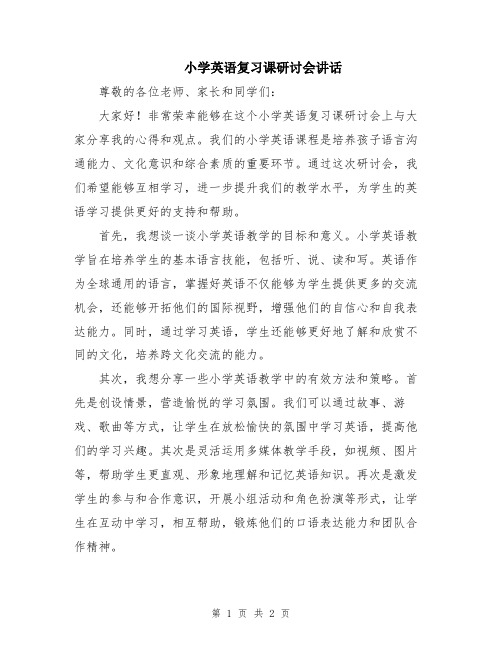
小学英语复习课研讨会讲话尊敬的各位老师、家长和同学们:大家好!非常荣幸能够在这个小学英语复习课研讨会上与大家分享我的心得和观点。
我们的小学英语课程是培养孩子语言沟通能力、文化意识和综合素质的重要环节。
通过这次研讨会,我们希望能够互相学习,进一步提升我们的教学水平,为学生的英语学习提供更好的支持和帮助。
首先,我想谈一谈小学英语教学的目标和意义。
小学英语教学旨在培养学生的基本语言技能,包括听、说、读和写。
英语作为全球通用的语言,掌握好英语不仅能够为学生提供更多的交流机会,还能够开拓他们的国际视野,增强他们的自信心和自我表达能力。
同时,通过学习英语,学生还能够更好地了解和欣赏不同的文化,培养跨文化交流的能力。
其次,我想分享一些小学英语教学中的有效方法和策略。
首先是创设情景,营造愉悦的学习氛围。
我们可以通过故事、游戏、歌曲等方式,让学生在放松愉快的氛围中学习英语,提高他们的学习兴趣。
其次是灵活运用多媒体教学手段,如视频、图片等,帮助学生更直观、形象地理解和记忆英语知识。
再次是激发学生的参与和合作意识,开展小组活动和角色扮演等形式,让学生在互动中学习,相互帮助,锻炼他们的口语表达能力和团队合作精神。
此外,我们还应注重培养学生的英语学习习惯和综合素养。
英语学习需要长期坚持和积累,因此我们需要引导学生养成良好的学习习惯,培养他们的自主学习能力。
我们可以通过设置学习计划、提供学习资源以及定期评估等方式,帮助学生养成良好的学习习惯和自我管理能力。
同时,我们也应该注重培养学生的创新思维和批判性思维,通过开展课外活动和提供多样化的学习资源,激发学生的学习兴趣和探究精神,培养他们的综合素养。
最后,我想强调家校合作在小学英语教学中的重要性。
学校和家庭是孩子成长的两个重要环境,只有学校和家庭紧密合作,才能更好地促进学生的全面发展。
家长可以与学校保持密切联系,了解学生的学习进展和困难,积极参与学校组织的家长会和活动,与学校共同为孩子的英语学习提供支持和指导。
六年级英语期末总复习经验交流发言稿
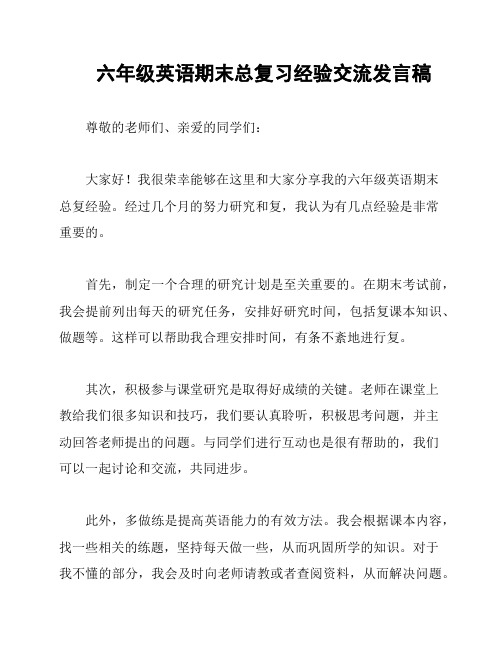
六年级英语期末总复习经验交流发言稿
尊敬的老师们、亲爱的同学们:
大家好!我很荣幸能够在这里和大家分享我的六年级英语期末
总复经验。
经过几个月的努力研究和复,我认为有几点经验是非常
重要的。
首先,制定一个合理的研究计划是至关重要的。
在期末考试前,我会提前列出每天的研究任务,安排好研究时间,包括复课本知识、做题等。
这样可以帮助我合理安排时间,有条不紊地进行复。
其次,积极参与课堂研究是取得好成绩的关键。
老师在课堂上
教给我们很多知识和技巧,我们要认真聆听,积极思考问题,并主
动回答老师提出的问题。
与同学们进行互动也是很有帮助的,我们
可以一起讨论和交流,共同进步。
此外,多做练是提高英语能力的有效方法。
我会根据课本内容,找一些相关的练题,坚持每天做一些,从而巩固所学的知识。
对于
我不懂的部分,我会及时向老师请教或者查阅资料,从而解决问题。
最后,保持良好的心态也非常重要。
期末考试是一项重要的评估,但不论成绩如何,我们都要保持积极乐观的心态,相信自己的努力一定会得到回报。
即使遇到困难,也要相信自己的潜力,坚持下去。
总的来说,通过制定研究计划,积极参与课堂研究,多做练,并保持良好的心态,我们一定能够取得好成绩。
希望我的经验可以对大家有所帮助。
谢谢!。
小学六年级英语教学研讨会发言稿

小学六年级英语教学研讨会发言稿
尊敬的各位领导、教师们:
大家好!我很荣幸能在这次小学六年级英语教学研讨会上发言。
我是XXX(你的名字),来自XXX小学,任教六年级英语。
首先,我想和大家分享一下我在教学过程中的一些经验和心得。
在六年级英语教学中,我一直坚持以学生为中心的教学理念,注重
培养学生的研究兴趣和动手能力。
我通过创设情境、激发学生的好
奇心和探究欲望,提高他们的参与度和研究效果。
其次,针对六年级英语教学中的难点问题,我总结了一些有效
的教学策略。
首先,我注重培养学生的听说能力,通过丰富的口语
练和真实的交流情境,让学生能够自信地运用英语进行口语表达。
其次,我注重培养学生的阅读理解能力,通过多样化的阅读材料和
精心设计的阅读任务,提升学生的阅读水平和理解能力。
此外,我
还注重培养学生的写作能力,通过启发性的写作任务和实践机会,
培养学生的写作思维和表达能力。
最后,我想说的是,六年级是小学阶段的最后一年,对于学生
的英语研究来说,起到了承上启下的作用。
作为教师,我们不仅要
培养学生的英语能力,更要培养他们的综合素质和研究能力。
因此,我们应该注重培养学生的研究兴趣和研究策略,引导他们积极主动
地参与研究,提高他们的自主研究能力。
同时,我们要为学生提供
良好的研究环境和资源,鼓励他们勇于探索、勇于创新。
在今后的教学实践中,我将继续努力,不断提升自己的教学水平,为学生创造更好的研究体验。
谢谢大家!
XXX(你的名字)。
小学六年级英语复习研讨会发言稿

小学六年级英语复习研讨会发言稿
尊敬的老师们、亲爱的同学们:
大家好!我今天非常荣幸能够在这个研讨会上分享我对小学六年级英语复的一些见解和经验。
首先,我想强调英语复的重要性。
英语作为一门国际语言,在我们的研究生活中扮演着至关重要的角色。
通过复英语,我们可以提高自己的听、说、读、写的能力,拓宽自己的视野,增加与世界沟通的机会,为未来的研究和工作打下坚实的基础。
接下来,我想和大家分享一些建议和方法,帮助大家更有效地进行英语复。
首先,合理规划复时间。
我们应该根据自己的实际情况,合理安排每天的英语复时间,坚持每天都进行一定的练和复。
这样可以帮助我们保持对英语的兴趣,提高研究效率。
其次,多听多说多读多写。
通过多听英语材料,比如英语歌曲、英语电影等,可以提高我们的听力水平。
多和同学们或老师们进行
英语口语练,可以提高我们的口语表达能力。
多读英语故事、课文
和练题,可以加深我们对英语语法和词汇的理解。
多写英文日记、
作文等,可以巩固我们的写作能力。
最后,要善于运用英语研究资源。
我们可以通过互联网、学校
图书馆等途径,获取到大量的英语研究资源,如英语课本、题册、
在线英语研究网站等。
我们应该善于利用这些资源,积极主动地进
行研究和复。
通过合理规划复时间,多听多说多读多写,善于运用英语研究
资源,我们一定可以在小学六年级英语复中取得好成绩。
谢谢大家!。
六年级英语复习教学研讨会发言稿
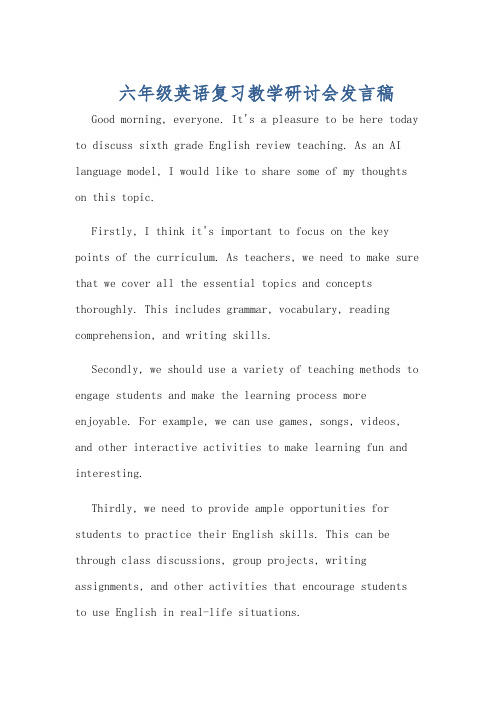
六年级英语复习教学研讨会发言稿Good morning, everyone. It's a pleasure to be here today to discuss sixth grade English review teaching. As an AI language model, I would like to share some of my thoughts on this topic.Firstly, I think it's important to focus on the key points of the curriculum. As teachers, we need to make sure that we cover all the essential topics and concepts thoroughly. This includes grammar, vocabulary, reading comprehension, and writing skills.Secondly, we should use a variety of teaching methods to engage students and make the learning process more enjoyable. For example, we can use games, songs, videos, and other interactive activities to make learning fun and interesting.Thirdly, we need to provide ample opportunities for students to practice their English skills. This can be through class discussions, group projects, writing assignments, and other activities that encourage students to use English in real-life situations.Finally, we should encourage students to take ownership of their own learning and set goals for themselves. By doing so, they will become more motivated and engaged in the learning process.总之,我们需要关注课程的重点,运用多种教学方法,提供足够的时间和机会让学生练习英语技能,同时鼓励学生自主学习和设定目标。
小学六年级英语期末座谈会发言稿
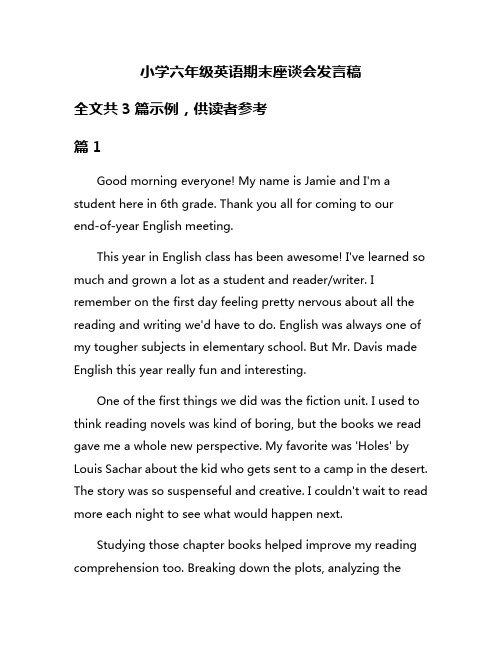
小学六年级英语期末座谈会发言稿全文共3篇示例,供读者参考篇1Good morning everyone! My name is Jamie and I'm a student here in 6th grade. Thank you all for coming to ourend-of-year English meeting.This year in English class has been awesome! I've learned so much and grown a lot as a student and reader/writer. I remember on the first day feeling pretty nervous about all the reading and writing we'd have to do. English was always one of my tougher subjects in elementary school. But Mr. Davis made English this year really fun and interesting.One of the first things we did was the fiction unit. I used to think reading novels was kind of boring, but the books we read gave me a whole new perspective. My favorite was 'Holes' by Louis Sachar about the kid who gets sent to a camp in the desert. The story was so suspenseful and creative. I couldn't wait to read more each night to see what would happen next.Studying those chapter books helped improve my reading comprehension too. Breaking down the plots, analyzing thecharacters, and looking at the themes made me think about stories in a totally new way. And the reading journals we kept helped practice putting those ideas on paper.We had some cool projects for that unit too like creating our own original mystery stories. I was really proud of the one I came up with about a group of kids who discover a haunted house at the edge of town. I even made some illustrations to go along with it. Creative writing is way more fun than I expected!Another highlight was the unit on persuasive writing. I know a lot of us started thinking more critically about advertisements, political speeches, and how people try to influence our opinions. Those skills will be super useful for analyzing media and fake news as we get older.For the persuasive essay, I argued that we should have recess before lunch rather than after. I came up with three big reasons why it made more sense and tried to back them up with lots of evidence. I even did a survey to get student opinions. Even though I didn't fully convince Mr. Davis, he said my essay was very well researched and organized.The public speaking part was scary at first, but presenting my persuasive speech in front of the class really boosted my confidence. I think speaking skills are so important in life fordoing things like interviews, presentations, or just communicating better in general. I'm way less nervous about that now.Aside from all the core reading and writing we did, the vocabulary work this year was really valuable too. All those roots, prefixes, and etymology lessons helped me learn so many new words. I loved the academic word games we'd play like Banterminal and Elevate. My vocabulary has grown a ton.Of course, no English class would be complete without grammar. Even though diagramming sentences was a huge pain at times, I can already tell it helped make my writing tighter and more polished. Knowing parts of speech, clauses, and phrases gives me a better handle on how to construct clear sentences.Overall, English this year was the highlight of sixth grade for me. The different units kept things fresh and engaging. I became a much stronger reader, writer, and thinker. The skills we practiced are great preparation for the transition to junior high too.Before I wrap up, I do want to say a huge thank you to Mr. Davis. His passion for English really came through and his lessons were always interactive and fun. He genuinely cared about everystudent's growth and pushed us just the right amount. Mr. Davis is an awesome teacher!So those are some of my biggest takeaways from 6th grade English this year. A special thank you again to the teachers, administrators, and families here today for your support. Have a great summer everyone!篇2Good morning everyone! My name is Emily and I'm a student in Mrs. Robinson's 6th grade class. Today I'm going to talk about my experience learning English this past year.When the school year started, I have to admit that I was pretty nervous about English class. I knew it was really important to learn English well, but it always felt like such a difficult subject for me. Reading was ok, but writing was hard and don't even get me started on speaking! Just the idea of standing up and trying to have a conversation in English made me want to freeze up. My mouth would go dry and I would get butterflies in my stomach.But Mrs. Robinson is such a great teacher. From the very first day, she worked hard to make us feel comfortable and confident. She was always positive and encouraging, no matter how many times we made mistakes. She reminded us that it's completelynormal to make mistakes when you're learning a new language. The important thing is to keep trying and not get discouraged.One of the things I really liked about Mrs. Robinson's class was how much we got to work in small groups and partners. We did a ton of conversational activities where we could practice speaking English in a low-pressure environment with just a few friends. Things like role-playing, discussing stories or articles we read, and working on group projects together. At first it felt awkward, but after a while I started to look forward to those activities because they helped build my confidence so much.We also did a lot of really fun educational games and activities to build our vocabulary and grammar skills. My favorite was this bingo game we played where we had to listen carefully and identify words based on their definitions. It was simple but really made me start listening closely to word meanings in篇3Good morning everyone! My name is Maya and I'm a student in 6th grade. Today, I've been given the great honor of sharing some thoughts about our English studies this past year.First off, I want to say a huge thank you to our amazing English teacher, Mr. Johnson. Your passion for the Englishlanguage is truly inspiring. From the very first day, you made learning English fun and engaging through games, songs, and creative projects. You helped transform what could have felt like a dry, academic subject into an adventure exploring new cultures, ideas, and ways of expressing ourselves.I'll never forget some of the memorable lessons and units we covered this year. Like when we read the novel "Holes" and you had us digging holes in the playground to understand what the characters went through. Or our poetry unit, where we analyzed classic works but then got to craft our own poems about anything from pets to sports to video games. Your hands-on, imaginative approach to teaching made even the toughest concepts stick.This year, we've grown so much in all areas of English - reading, writing, speaking, and listening. At the start, I feltself-conscious about my English abilities compared to my classmates. But Mr. Johnson's encouraging spirit helped me gain confidence. He celebrated every small success and showed us that making mistakes is just part of the learning journey.In reading, we've become skilled at analyzing all kinds of texts - from fiction and nonfiction books to articles, poetry, scripts and more. We've learned strategies like close reading,annotating, and really digging into the deeper meaning and purpose behind the author's words. I used to just skim readings for a basic idea, but now I pay attention to details like word choice, symbolism and literary devices. My comprehension and analysis abilities have grown tremendously.As writers, we've made incredible strides too. We started practicing the full writing process - brainstorming ideas, drafting, revising, editing, and publishing. At first, this seemed tedious, but then we saw how each step elevated our writing. We explored different genres and formats like narratives, informational essays, persuasive pieces, and more. I was amazed at how crafting a strong thesis statement, using descriptive language, and integrating evidence transformed my writing from flat to multi-dimensional. I actually get excited about writing assignments now!Our speaking and listening abilities have skyrocketed this year as well. Thanks to plentiful opportunities for discussion, debates, presentations, and group work, I've become a stronger communicator and listener. I'm better able to articulate my thoughts, consider multiple perspectives, and engage with others' ideas. Whenever I stumbled over vocabulary or got flustered, Mr. Johnson and my classmates were supportive. Thiscreated a safe space to practice expressing ourselves verbally in English.On top of the core reading, writing, and communication skills, we've also learned so much about the cultures of English-speaking nations - their histories, traditions, arts, and more. We've analyzed cultural perspectives in books and film, examined current events, and even tried our hands at some folk arts and games. I have a deeper appreciation now for how rich and diverse the English-speaking world is.Of course, this year came with its share of challenges too. There were some frustrating grammar lessons that made my brain hurt. Like when we spent weeks diagramming sentences and mastering dependent and independent clauses. Study strategies and memorization tricks from Mr. Johnson helped make even the dry topics more digestible. And now I actually understand how to construct proper sentences!There were also times when group work was difficult - when some took a backseat while others did most of the heavy lifting. Or when our different personalities caused tension or miscommunication. But we learned invaluable skills about collaboration, communication, and conflict resolution that'll benefit us forever.Amidst these challenges, our class also faced the unexpected obstacles of remote and hybrid learning due to the pandemic. I'll be honest - having to adapt to new technology, not being able to work directly with classmates, and just the general disruption of our normal school routines made learning English a lot harder some weeks. But Mr. Johnson embraced it as an opportunity to build our digital literacy and communication skills for the modern world.Looking back on this rollercoaster of a year, I'm amazed by how much we've grown in our English journey. We've become stronger readers, writers, speakers, listeners, communicators, and learners. More importantly, we've developed a deeper appreciation for the boundless opportunities that English opens up - to understand diverse perspectives, access information, express ourselves creatively, and connect across cultures.To our families and others supporting our English education - thank you for your encouragement along the way. Your involvement in our learning made a huge difference. And to my incredible classmates - what a year it's been! I'll cherish all the memories we've made learning together, supporting each other, and becoming a tightly bonded crew. You all made class fun and inspiring.Lastly, thank you again Mr. Johnson for an unforgettable year. You've not only taught us skills for academic success, but life skills about resilience, curiosity, and having a growth mindset. You've instilled a love of learning and language that we'll carry with us forever. We'll deeply miss your energetic presence and creative approach to teaching.As we get ready to transition to junior high and eventually high school, college, and careers, the English foundations we've built this year will be invaluable. Although our English journey is just beginning, we're well on our way to becoming skilled communicators and lifelong learners. Thank you all, and have a wonderful summer!。
六年级备考交流发言稿英语

Good morning! I am honored to stand here today to share with you my thoughts and experiences regarding the preparation for the sixth-grade examination. As we all know, the sixth-grade examination is asignificant milestone in our academic journey. Therefore, it is crucial for us to make adequate preparations to achieve the best possible results.Firstly, let me talk about the importance of time management. Time is a precious commodity, and we should make the most of it. As students, we often find ourselves juggling between schoolwork, extracurricular activities, and family life. To ensure that we have enough time for study, we need to prioritize our tasks and set realistic goals. By allocating specific time slots for studying, we can avoid the last-minute rush and achieve a balanced lifestyle.Secondly, a well-structured study plan is essential. We should identify the key subjects and topics that we need to focus on. For instance, mathematics, science, and Chinese are vital subjects that require extra attention. We can break down the topics into smaller units and study them systematically. Additionally, it is helpful to review the lessons we have learned in previous grades to lay a solid foundation for the upcoming examination.Furthermore, active learning methods can significantly enhance our understanding and retention of knowledge. Instead of merely reading textbooks, we can engage in various activities such as group discussions, flashcards, and practice problems. These methods not only make the learning process more enjoyable but also enable us to grasp the concepts more effectively. Moreover, we should not hesitate to seek help from teachers, parents, or even our peers when we encounter difficulties.Another crucial aspect is maintaining good health. A healthy body contributes to a clear mind, which is essential for studying. Therefore, we should ensure that we get enough sleep, eat a balanced diet, and exercise regularly. These habits will not only keep us physically fitbut also enhance our mental well-being.In addition, we should develop positive attitudes towards the examination. Many students tend to feel anxious or stressed about the examination, which can hinder their performance. Instead, we should approach the examination with confidence and determination. Remember, the examination is not the end of our journey but a stepping stone to our future success.Lastly, I would like to emphasize the importance of self-motivation. We should set personal goals and strive to achieve them. By constantly challenging ourselves and pushing our limits, we can develop a strong sense of accomplishment and boost our self-esteem.In conclusion, the preparation for the sixth-grade examination requires careful planning, dedication, and perseverance. By managing our time effectively, developing a well-structured study plan, adopting active learning methods, maintaining good health, cultivating positive attitudes, and fostering self-motivation, we can undoubtedly achieve excellent results in the examination. Let us all work together and strive for success!Thank you for your attention!。
小学六年级英语质量研讨会发言稿

小学六年级英语质量研讨会发言稿小学六年级英语质量研讨会发言稿在当下社会,发言稿应用范围愈来愈广泛,好的发言稿可以引导听众,使听众能更好地理解演讲的内容。
那么,怎么去写发言稿呢?下面是我为大家收集的小学六年级英语质量研讨会发言稿,供大家参考借鉴,希望可以关怀到有需要的伴侣。
各位领导、老师:大家下午好!首先我就我校六年级英语学情分析一下,我校六年级3个班共151人,上期期末考试中,1班3A生英语占8人,2班3A生英语占12人,3班3A生英语占15人,年级平均分69.5。
在5所学校排第四,成果不是很理想。
本年级学生在英语学习方面存在的问题主要是两极分化严重,优生少,差生多,处于中游水平的学生学习主动性不够高,思想懈怠,成果难以提升。
针对目前的现状,我将从以下几个方面做好下一步的复习工作:一、继续做好学生的思想动员工作。
首先要留意做好学生的心理和心情调试工作,与学生沟通,准时了解学生的状况和思想动态,使他们保持不怕苦、不怕累的精神,摆正学习看法,准时表扬和鼓舞学生,让他们保持学习的自信念,兴趣盎然。
二、根据准备,精讲多练,讲练结合,突出重点。
尽快完成新课,然后对所学学问进行科学地整理、归纳、概况、总结,使学问系统化,以便得以更深地理解。
以课本为主,每复习一项学问,皆配以适当的`同步练习或单项练习,做到学有所练,学练结合。
尤其对于学生难以理解、简洁混淆的语言现象,多讲多练使学生尽快把握。
三、做好学法指导。
继续做好学生的学习方法指导,通过自编儿歌、找规律等方式关怀学生快速把握复习内容。
同时教给学生做题的方法,通过对题型的分析和讲解,配以适当的练习与指导,使学生从中觉察题目的特点,从而找到做题的规律,把握基本的解题思路、解题方法和技巧,获得较好效果。
四、进一步做好检测工作。
多方面收集各学问要点题目,对学生进行检测,并准时对检测中出现的问题进行讲解、反馈,学生做好错题记录,以备复习时用。
在此过程中,切忌天天考,而更应注重系统学习和提示练习。
- 1、下载文档前请自行甄别文档内容的完整性,平台不提供额外的编辑、内容补充、找答案等附加服务。
- 2、"仅部分预览"的文档,不可在线预览部分如存在完整性等问题,可反馈申请退款(可完整预览的文档不适用该条件!)。
- 3、如文档侵犯您的权益,请联系客服反馈,我们会尽快为您处理(人工客服工作时间:9:00-18:30)。
六年级英语期末复习研讨会发言稿
六年级英语期末复习研讨会发言稿
一、学生情况分析:
本班有学生40人,学生英语基础差,学习习惯不好,而且对英语学习没有兴趣,尤其是大部分男同学,彻底失去了学习英语的兴趣。
上时,不能按老师的要求去做,听不懂前面已经学习的单词的意思,就连完整的句子也读不下,更别说句子的意思了;对于让默写出单词,那更是水中捞月,雾里看花。
一旦失去了奋斗的目标,也就没有了学习的动力,因此,针对这样一个现状,我制定的本学期的复习计划。
二、复习重点:
1.能听说读写教材生词表部分打五角星的四会单词,中的重点句型,以及描述自己一天的作息时间、最喜欢的季节、生日以及涉及到的现在进行时的几个话题,要求能在真实语境中正确运用并能读懂简短语篇。
主要语法项目是一般现在时和现在进行时。
2.能听说认读教材生词表部分黑体单词。
3.以下是四会要掌握的12组句子:
(1)hen d u …? I …at …in …
(2)hat d u d n the eeend? Usuall I …Seties I …
est
hih seasn d u lie best? I lie …b)3(.
(4)h d u lie…? Beause…
()hen is ur birthda? birthda is in …
(6)Is her birthda in une? es, it is/N, it isn't
(7)hat's the date? une 9th
(8)hat are u ding? I a /e are…
(9)hat is it/he/she ding? It/She/He is…
(10)Are the/u ding …n? es, the/e are N, the/e aren't
Is it/she/he ding …n? es, it/she/he is N, it/she/he isn't
三、复习教学方法
1.目的性:帮助学生发展语言技能、培养运用语言能力,不只是为了考试。
2.全体学生:复习教学活动设计应该面向各个层次的学生的学习,使得好的学生在巩固知识的同时,运用语言的能力更好得到发展;一般的学生能有效加深理解所学内容,系统巩固所学知识;弱的学生也在帮助下使所学知识得到巩固和加强,从而消除对英语学习的畏惧心理障碍。
3组织复习材料:根据复习内容和复习目标,精心选择和设计复习材料,帮助学生对所学的内容加深理解并从中得出一些规律,从而使学生对知识的系统性有更深的认识,实际运用能力也得到相应的发展。
根据学生的情况出2到3张综合练习卷,提供给学生一个模拟实战
的机会,并根据考试情况及时巩固学生某些语言点或者练习上的不足,迎接考试!.
这期间主要是补差工作,本年级英语学习中两极分化特严重,因此根据这个情况,复习期间应该进行因材施教,特殊情况采取特殊复习的方法,主要抓后进生的单词、词组、句子的过关情况以及的认读,一些语法知识让他们记会做题的方法,出一些相对比较简单的题目,让他们体会成功的快乐,并对考试充满信心。
四、应注意的问题
1、教师在复习过程中,要特别注意留一定的时间让学生记忆单词,这是不可或缺的。
因为学生下去后没有时间进行口头练习,而且上时,也没有多余的时间给学生记忆单词。
2、复习时,对于每一个语法现象,教师不必给予太清楚的说明了,只要学生能够会运用,这就达到了目标。
3、本中出现的动词的语法知识,一定要求学生记住并且会运用。
4、中的句子,学生要知道它的汉语意思,这要花一定的时间给学生进行复习,对于我们班的特殊情况,逐句逐词进行讲解,直到学生掌握为止。
